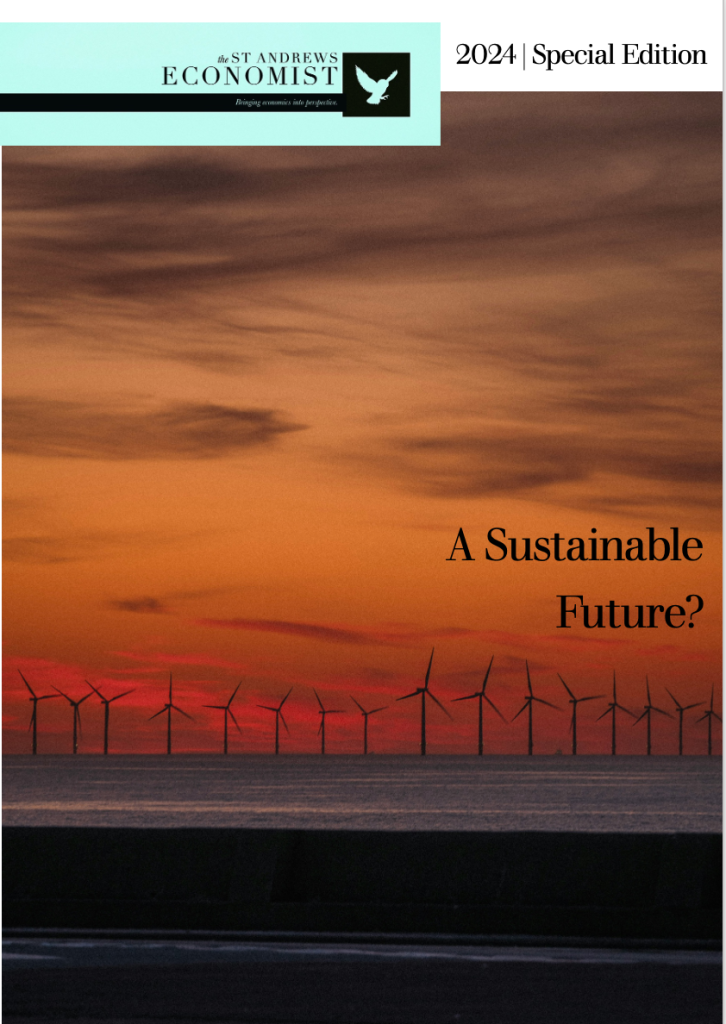Click the image below to download the full 2024 Special Edition:
Reflecting on the tumultuous seas of global affairs, it’s remarkable how a single year can encapsulate such a diverse array of themes. From geopolitical tensions to societal upheavals, the canvas of 2023 painted a picture of both challenge and opportunity. However, as we embark on this special edition dedicated we hope to offer glimpses of the future. As many global initiatives, both in governmental policy and corporate action, are embracing sustainability, we are shown that sustainable practices offer important solutions going forward. With this in mind, we thought exploring the potentials of sustainability would be a would be an exciting theme to explore in this Special Edition.
In ‘Cultivating Climate Resilience: Traditional Techniques in African Agriculture’, Matthew Candau highlights the increasing vulnerability of sub-Saharan Africa’s agriculture to climate change. He advocates the use of indigenous knowledge and practices to offer promising solutions for resilience and sustainability for the future.
Bengu Caliel’s thought-provoking exploration in ‘Is ESG a deception of sustainable finance?’ invites us to critically examine the authenticity of sustainable finance initiatives, challenging us to ensure that our efforts align with genuine environmental stewardship. By exploring the origins of ESG, its meteoric rise in recent years driven by global challenges and regulatory initiatives, and the role of ESG ratings in sustainable finance, he critiques the current state of ESG, highlighting inconsistencies in rating systems and instances of greenwashing by companies.
Lily Bolash’s evocative piece, ‘Under the Sacred Canopy: On Sustainability, Brazil, and the Amazon Rainforest’, transports us to the heart of the Amazon as she discusses the Yanomami people’s connection to the Amazon, the threats posed by deforestation and mining while emphasising the global challenge of climate politics and the need for action to address environmental degradation and ensure justice for indigenous communities.
Brooke Ryback examines the rapid urbanization in Latin America in ‘The Emerging and Sustainable Cities Initiative: what one program says about Latin America’s sustainable development agenda’. She highlights both the positive economic growth and the challenges of urban poverty and environmental vulnerability, noting successes in infrastructure improvements and citizen engagement, yet also the challenges in garnering participation and navigating conflicting interests in sustainable development efforts across the region.
Charlotte Plaskwa’s sobering reflection in ‘Beyond the Prescription: The Ecological Cost of Pharmaceutical Practices’ challenges us to confront the environmental consequences of our healthcare systems, urging us to prioritize sustainability in all aspects of life. The article explores how pharmaceutical practices contribute to environmental degradation through factors like greenhouse gas emissions, waste generation, and pharmaceutical pollution in water bodies, underscoring the urgency of implementing sustainable measures and regulatory frameworks to safeguard wildlife, ecosystems, and human health.
In ‘Ever-evolving Zoos: The role of zoos in the 21st century?’ Logan Elliot examines the contentious history of zoos, critiquing their origins in exploitation and animal abuse while acknowledging recent efforts toward conservation and education. Despite concerns about environmental impact and profit motives, some zoos are shifting toward non-profit models and actively engaging in conservation efforts and community education, challenging traditional perceptions and advocating for a more sustainable approach to wildlife preservation.
Alexander Wylie’s incisive inquiry in ‘Can Finance be Sustainable in a World of Shareholder Value Maximisation?’ challenges conventional notions of financial success, urging us to redefine value in terms of long-term sustainability. He examines the effectiveness of climate activism and questions whether efforts have truly impacted these corporations or inadvertently affected the working class.
Tom Fort’s exploration of European hydropower in ‘European Hydropower: A Key to Sustain and Strengthen a Continent’ underscores the pivotal role of renewable energy in forging a sustainable future for generations to come. He discusses the EU’s significant reduction in carbon emissions which is credited to a shift towards green technologies.
As we navigate the complex currents of sustainability, may this Special Edition serve as a compass, guiding us towards a more harmonious relationship with our planet. Let us seize the opportunities presented by 2023 to redouble our efforts towards building a more sustainable and equitable world.
From the desk of the Editors-in-Chief of the St Andrews Economist, we sincerely hope you enjoy!
Alexander Wylie, Brynna Boyer and Molly Pimm
Click the image below to download the full 2024 Special Edition:

